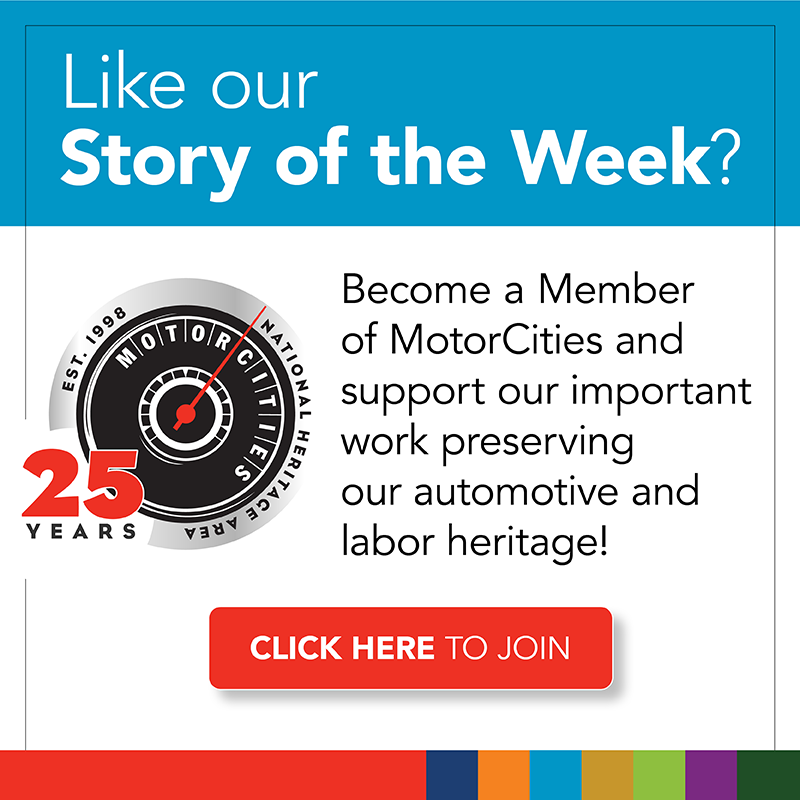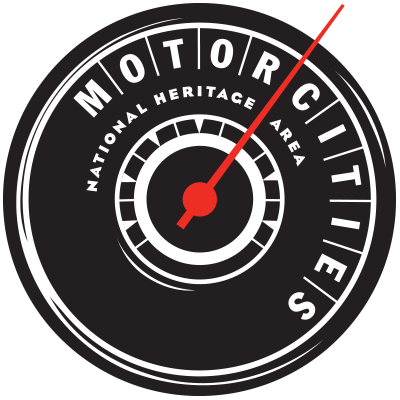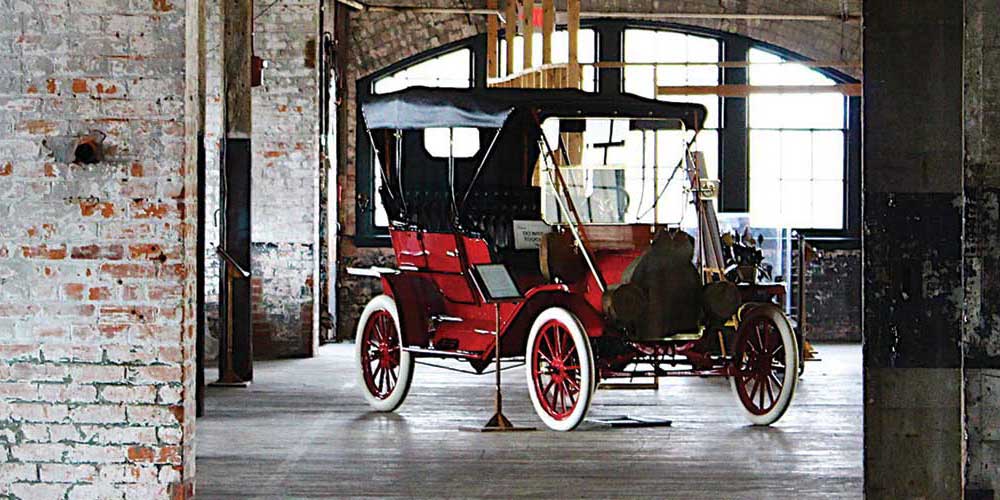By Robert Tate, Automotive Historian and Researcher
Images courtesy of the National Automotive History Collection
Posted: 03.20.2017
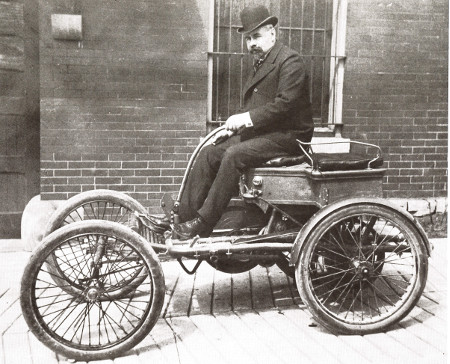 Inventor Thomas Jeffery on his first experimental Ramber in 1897.In 1902, the late Mr. Thomas B. Jeffery had developed the first Rambler assembly line at their plant in Kenosha, Wisc. Jeffrey had built 1,500 automobiles making Rambler one of the world's first mass-producers of vehicles.
Inventor Thomas Jeffery on his first experimental Ramber in 1897.In 1902, the late Mr. Thomas B. Jeffery had developed the first Rambler assembly line at their plant in Kenosha, Wisc. Jeffrey had built 1,500 automobiles making Rambler one of the world's first mass-producers of vehicles.
Jeffrey, who had emigrated from England, built the original one-cylinder Rambler at the turn of the century and established a manufacturing plant for the production of Rambler vehicles. Mr. Jeffery’s journey began some 20 years earlier when he manufactured and sold Rambler bicycles in Chicago from 1878 to 1900. On an historical note, when the first Jeffery-built Rambler automobile was available for sale in the spring of 1902, it marked the introduction of the world’s second mass-produced vehicle a year after Oldsmobile and a year ahead of Ford.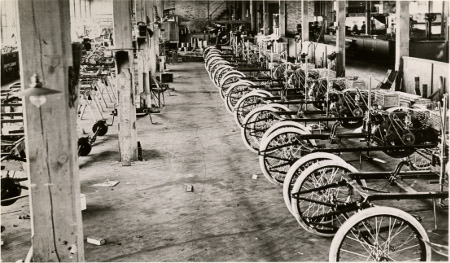 Nash’s first assembly line in 1902.Through the 1930s, the Rambler manufacturing plants in Kenosha encompassed 101 acres of ground with floor space totaling over 1.6 million square feet of space and over 4,000 assembly line workers to manufacture Rambler products.
Nash’s first assembly line in 1902.Through the 1930s, the Rambler manufacturing plants in Kenosha encompassed 101 acres of ground with floor space totaling over 1.6 million square feet of space and over 4,000 assembly line workers to manufacture Rambler products.
The Seaman Body plant was also involved in the process of manufacturing great looking products for Rambler. The company was located in Milwaukee, Wisc. In 1924, Nash had purchased the plant of the defunct Mitchell Motor Car Company of Racine, Wisc. It was there in the late 1920s that the Nash Light Six model vehicle was built and manufactured for the consumer market. In 1934, Nash assembly line workers had manufactured its 1 millionth automobile.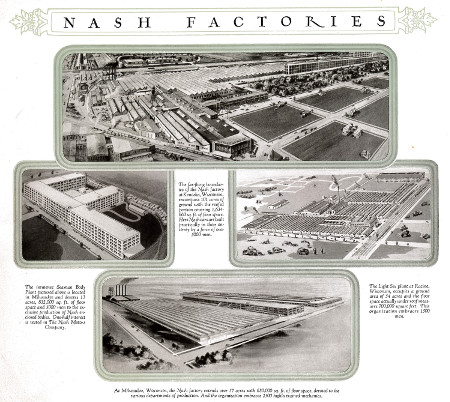 Nash factories in Kenosha, Racine and Milwaukee circa. 1927.During the war, the last Nash rolled from the assembly line at Kenosha in early 1942. For the next three years during the wartime efforts, Nash-Kelvinator Corp., had manufactured more than $6 million in aircraft engines, propellers, helicopters, bomb fuses along with other war material from their plants in Detroit, Grand Rapids, Milwaukee, Kenosha, Racine and Lansing.
Nash factories in Kenosha, Racine and Milwaukee circa. 1927.During the war, the last Nash rolled from the assembly line at Kenosha in early 1942. For the next three years during the wartime efforts, Nash-Kelvinator Corp., had manufactured more than $6 million in aircraft engines, propellers, helicopters, bomb fuses along with other war material from their plants in Detroit, Grand Rapids, Milwaukee, Kenosha, Racine and Lansing.
The 1950s brought major change for Rambler, and the country’s largest corporate merger for the time, when on May 1, 1954, Nash-Kelvinator merged with the Hudson Motor Car Co. to form American Motors Corp.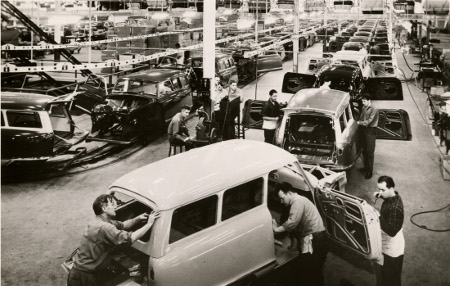 A Nash factory in 1951.As the manufacturing process would continue, a flow of parts and materials to the Kenosha assembly line was coordinated by means of tel-autograph messages that could be sent to 26 control points throughout the plant for the process of manufacturing. Nash and Hudson single-unit bodies moved along the make-up line after leaving the storage area.
A Nash factory in 1951.As the manufacturing process would continue, a flow of parts and materials to the Kenosha assembly line was coordinated by means of tel-autograph messages that could be sent to 26 control points throughout the plant for the process of manufacturing. Nash and Hudson single-unit bodies moved along the make-up line after leaving the storage area.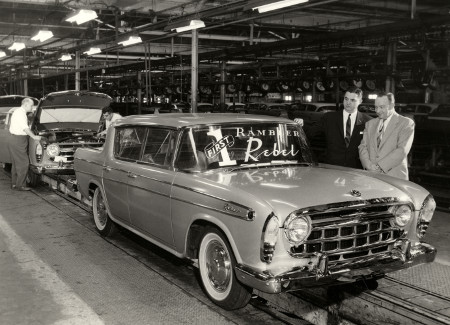 The first Rambler Rebel model rolls off the assembly line.In 1957, American Motors had introduced a new high performance automobile called the Rambler Rebel and it was a great looking car. As seen in the above photo, looking over the model at the time were J. W. Mueller (left), who was the works manager, and D. R. Hutchinson who was the General Chassis Superintendent.
The first Rambler Rebel model rolls off the assembly line.In 1957, American Motors had introduced a new high performance automobile called the Rambler Rebel and it was a great looking car. As seen in the above photo, looking over the model at the time were J. W. Mueller (left), who was the works manager, and D. R. Hutchinson who was the General Chassis Superintendent.
The 1957 Rambler Rebel models offered the consumer a four-barrel carburetor and an electronic fuel injection. During the engineering testing, the 255-horse power model, which was equipped with an overdrive, could accelerate from zero to 60 in less than eight seconds. All Rebel models were painted silver with gold-anodized spears were built. It was documented that between 1,0000 to 1,500 models were ever produced.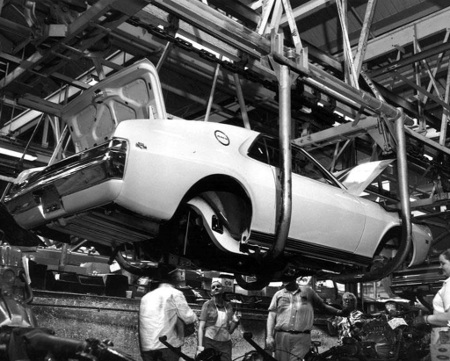 The AMX assembly line circa. 1969-1970.During the 1960s, AMC produced the AMX which was a sporty design that many customers really enjoyed. The AMX was introduced in 1968 and instantly created widespread interest among performance-minded enthusiasts. The AMX models were manufactured at the old Rambler plant in Kenosha.
The AMX assembly line circa. 1969-1970.During the 1960s, AMC produced the AMX which was a sporty design that many customers really enjoyed. The AMX was introduced in 1968 and instantly created widespread interest among performance-minded enthusiasts. The AMX models were manufactured at the old Rambler plant in Kenosha.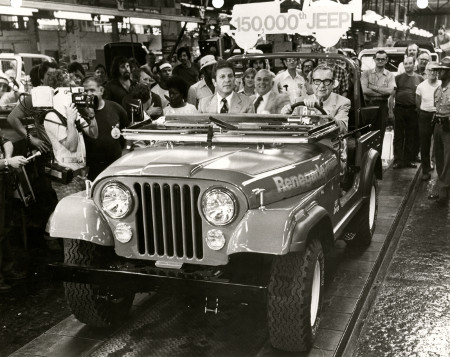 The 150,000th Jeep rolls off the line at a plant in Toledo, OH; Ohio Gov. James Rhodes drove the vehicle off the line, and seated next to him is Gerald C. Meyers, President and CEO of American Motors.
The 150,000th Jeep rolls off the line at a plant in Toledo, OH; Ohio Gov. James Rhodes drove the vehicle off the line, and seated next to him is Gerald C. Meyers, President and CEO of American Motors.
During the 1970s, the 150,000th Jeep vehicle rolled off the assembly line in Toledo, OH. Pictured above, Ohio Gov. James A. Rhodes (right) and Gerald C. Meyers, President and Chief Executive officer of American Motors drove the milestone Jeep vehicle off the assembly line.
In conclusion, American Motors has always had a great story and long legacy that will always be a part of our automotive history.
A special thanks to Robert Tate, Automotive Historian and Researcher, for contributing this story to the MotorCities Story of the Week Program.
For further information on photos please visit http://www.detroitpubliclibrary.org/ or email This email address is being protected from spambots. You need JavaScript enabled to view it.. Please do not republish the story and/or photographs without permission of MotorCities National Heritage Area. (Bibliography: American Motors Corporation first edition February 1969; Foster, R. Patrick. “AMC cars 1954-1987”)
If you would like to contribute an article for the MotorCities newsletter, email This email address is being protected from spambots. You need JavaScript enabled to view it. or call 313-259-3425.
